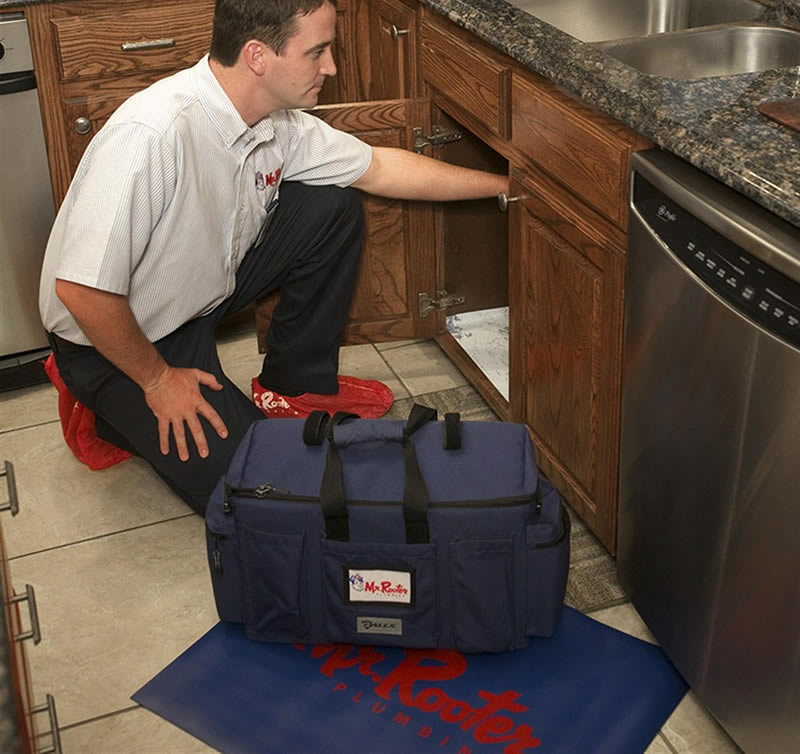How to Fix a Leaking Sink
Leaks in kitchen sinks can be inconvenient and potentially costly for homeowners, wasting water and increasing your water bill, and damaging kitchen cabinets and floors. But with proper knowledge and tools, fixing a leaking sink can be done independently. In this article, we will go over the causes and signs of leaking sinks, steps to stop kitchen sink leaks yourself when to contact a plumber from Mr. Rooter Plumbing, and potential costs associated with fixing kitchen sink leaks.
Causes of Leaking Sinks
There may be many causes of a leaking sink. Some of the more likely factors include:
- Worn-out seals: Over time, the rubber seals that keep water from seeping around your sink's plumbing fixtures may wear down or crack, causing leakage issues.
- Loose or damaged pipes: If the pipes underneath your sink become loose or damaged, water could seep out and escape into your kitchen or bath requiring sink repair.
- Corroded Pipes: Corrosion can weaken and develop holes in pipes, potentially resulting in leakage issues.
- Cracked Sink: If a sink basin or one of its components, such as the drain or faucet, is cracked, water can seep through and leak.
Signs of a Leaking Sink
The signs of a leaking sink depend on its severity; some typical indicators include:
Dripping Sounds: This could indicate a leak if you hear dripping sounds coming from under the sink.
- Standing water: If there's standing water around your sink, that could indicate an unchecked leak that requires immediate attention.
- Musty Odors: Smelling musty odors from under the sink may be a telltale sign of an undetected leak that has gone undetected for some time.
- Discolored or damaged Cabinets: If the cabinets beneath your sink appear discolored or damaged, this could indicate long-term leaks.
DIY Steps to Prevent Kitchen Sink Leaks
If your sink is leaking, there are various steps you can take yourself to fix it yourself. Here is a step-by-step guide.
Before beginning work on the sink, turn off its water source - this will prevent leakages during your work sessions and will ensure a safer working environment for yourself and other professionals.
- Locate the Source of Leak: You can investigate where the leak originates once the water supply has been cut off. Check under your sink pipes and rubber seals around any plumbing fixtures for signs of wear or damage that could indicate where it comes from.
- Tighten loose connections: If any loose connections are detected, tighten them securely with a wrench; however, take care not to overtighten them and cause damage.
- Replace Damaged Parts: If any damaged components, such as corroded pipes or worn-out seals, have been discovered, make sure they're promptly replaced. Your local hardware store should carry replacements.
- Seal Your Sink: If leakage comes from around your sink basin, use a plumber's putty or silicone caulk to seal this area and prevent further leaks.
Once the leak has been addressed, switch on your water supply again to conduct further checks for possible leaks.
When to Contact a Plumber About a Kitchen Sink Leak
However, some kitchen sink leaks should be handled professionally to prevent further problems: Here are some signs you should contact a plumber:
- Unable to locate the source: If the source of your leak cannot be located, calling in a plumber may be your best bet. They have special tools and knowledge to track down and fix hard-to-find leaks.
- Severe link: Suppose the leak is severe and causes flooding or water damage to cabinets and floors. In that case, it's wise to contact a plumber immediately, as they will quickly assess the situation and take measures to stop further damage.
- You lack the tools or experience: If you lack the necessary tools and expertise to fix a leak on your own, it may be in your best interests to seek professional assistance instead of trying on your own - this could cause further damage and could cost more in repairs down the line.
Costs associated with Fixing Kitchen Sink Leaks
Cost estimates for kitchen sink leak repair vary based on their severity and damage severity, but here are some estimated figures:
- DIY repairs: If you can manage to address the leak yourself, the costs may be minimal. In most cases, only replacement parts (ranging from rubber seals and sinks) must be purchased - this could save hundreds of dollars in labor fees!
- Professional repairs: When hiring a plumber, the costs will depend on its severity and duration; on average, homeowners should expect to spend between $150-450 for professional repairs.
- Additional repairs: If the leak has caused damage to cabinets or floors, additional repairs may be necessary. Their costs depend on both their severity and any materials necessary for them.
Mr. Rooter Plumbing
Mr. Rooter Plumbing is dedicated to helping homeowners with all their plumbing needs, such as fixing leaking sinks. Our team of licensed and experienced plumbers possesses all of the expertise and tools required to identify and address leaks in your kitchen sink quickly. At Mr. Rooter Plumbing, customer satisfaction is paramount; thus, we provide prompt and reliable services to address the issue immediately. Reach out now and schedule an appointment - let us assist with your sink leak!
